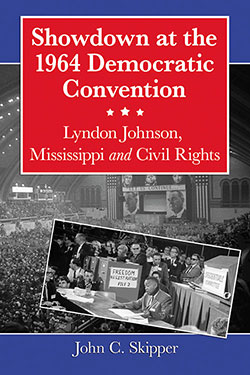Showdown at the 1964 Democratic Convention
Lyndon Johnson, Mississippi and Civil Rights
$29.95
In stock
About the Book
In the summer of 1964, three forces converged at the Democratic National Convention in Atlantic City, New Jersey, each with the potential to shake the moorings of traditional democracy: the all-white segregationist delegation from Mississippi, a mostly black delegation determined to unseat the segregationists, and President Lyndon Johnson, who had signed the civil rights bill but wanted to avoid trouble that could jeopardize his chances of carrying the South in the November election. These groups struggled to reach a “compromise” that in the end epitomized sheer political power and its consequences. By examining the motivations of those involved, this work explores how American politics and the civil rights movement clashed at the convention, how the federal government felt compelled to spy on its own people for purely political purposes, and how this interlude changed the political landscape for generations.
About the Author(s)
Bibliographic Details
John C. Skipper
Format: softcover (6 x 9)
Pages: 218
Bibliographic Info: 46 photos, notes, bibliography, index
Copyright Date: 2012
pISBN: 978-0-7864-6161-5
eISBN: 978-0-7864-9131-5
Imprint: McFarland
Table of Contents
Preface 1
Introduction 5
1. The Movement 11
2. Robert Moses 24
3. Lyndon Johnson 41
4. A Nation Awakened 55
5. The Republican Revolution 67
6. The Journey 74
7. Political Espionage 83
8. Showdown 96
9. Compromises and Consternation 112
10. Into the Lion’s Den 124
11. A Compromise and a Lynching 134
12. Power, Protest and Politics 151
13. The Forces of Human Decency 159
14. Turning Points 164
15. Political Espionage Documented 175
Epilogue 179
Chapter Notes 193
Bibliography 203
Index 207
Book Reviews & Awards
Choice Outstanding Academic Title
“a wonderfully constructed story and excellent account for everyone…highly recommended”—Choice; “this interesting volume on American civil rights history examines the competing factions at the 1964 Democratic National Convention and explores the ways in which demands from three power bases collided resulting in a realignment of the political course of race relations”—Reference & Research Book News.





